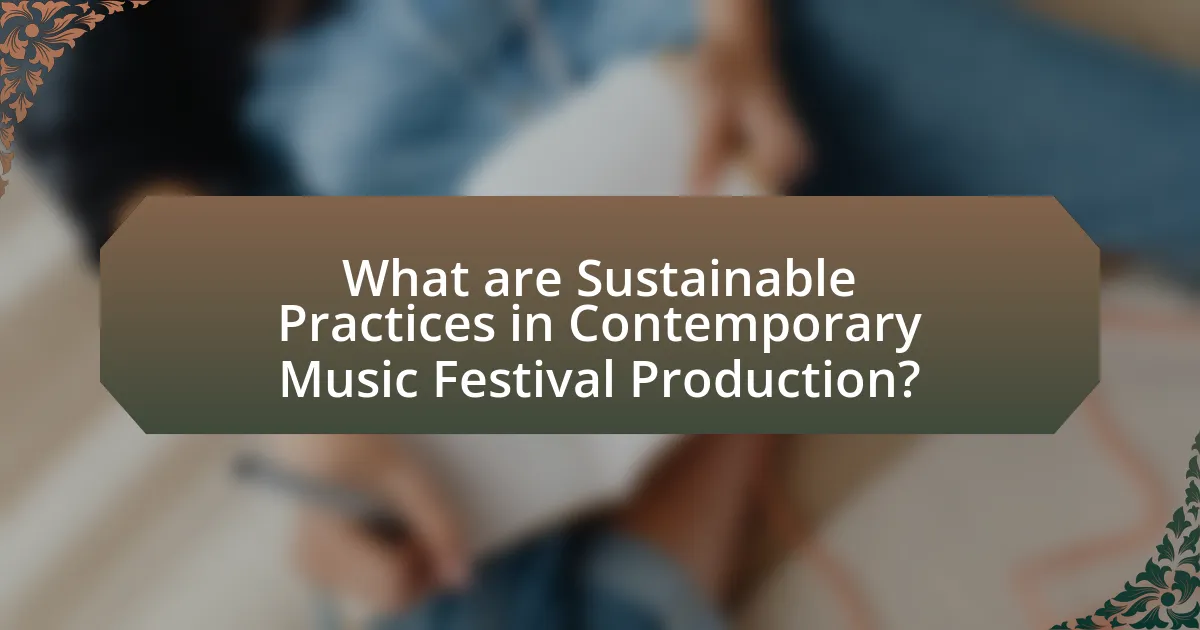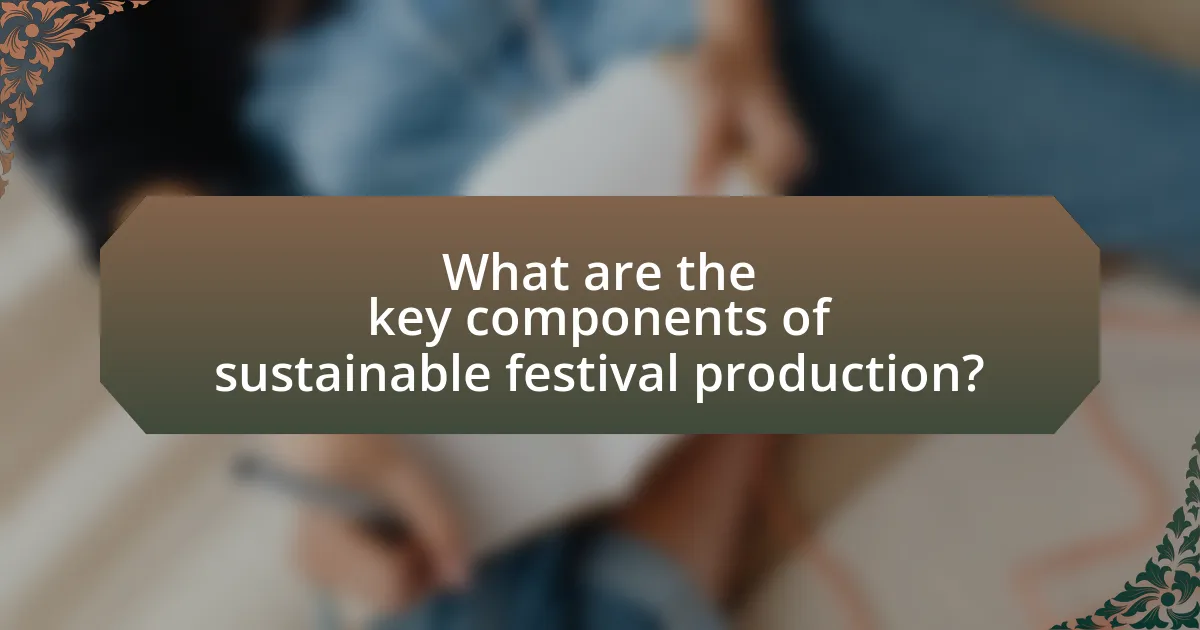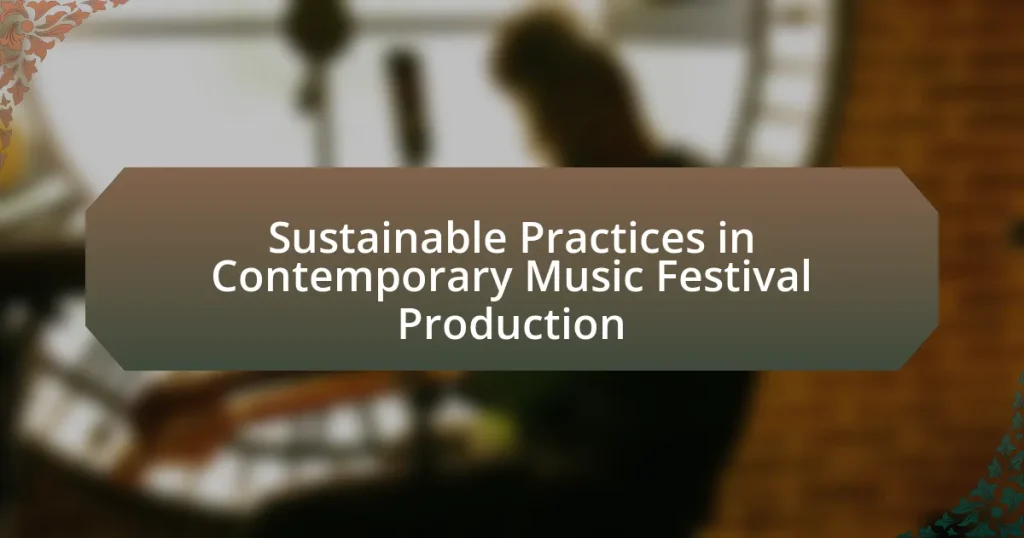Sustainable practices in contemporary music festival production focus on waste reduction, energy efficiency, and sustainable sourcing of materials. Key strategies include implementing recycling and composting programs, utilizing renewable energy sources like solar power, and sourcing food and merchandise locally to minimize environmental impact. These practices not only contribute to environmental conservation by reducing carbon footprints and promoting biodiversity but also enhance the festival experience for attendees. Challenges faced by organizers include financial constraints and stakeholder resistance, which can be addressed through education and collaboration. Successful examples from festivals like Glastonbury and Coachella illustrate effective sustainability initiatives that can serve as models for future events.

What are Sustainable Practices in Contemporary Music Festival Production?
Sustainable practices in contemporary music festival production include waste reduction, energy efficiency, and sustainable sourcing of materials. Festivals implement recycling and composting programs to minimize landfill waste, with some achieving over 70% waste diversion rates. Energy-efficient technologies, such as solar power and LED lighting, are increasingly utilized to reduce carbon footprints, with some festivals reporting up to 50% energy savings. Additionally, sourcing food and merchandise from local and organic suppliers supports local economies and reduces transportation emissions, aligning with sustainability goals. These practices not only mitigate environmental impact but also enhance the overall experience for attendees by promoting awareness and engagement with sustainability issues.
How do these practices contribute to environmental conservation?
Sustainable practices in contemporary music festival production contribute to environmental conservation by reducing waste, minimizing carbon footprints, and promoting biodiversity. For instance, implementing waste management systems that prioritize recycling and composting can significantly decrease landfill contributions, with festivals like Glastonbury reporting a 50% reduction in waste through such initiatives. Additionally, utilizing renewable energy sources, such as solar power, helps lower greenhouse gas emissions, as evidenced by the Coachella Valley Music and Arts Festival, which has incorporated solar energy to power stages and facilities. Furthermore, promoting local food sourcing supports sustainable agriculture and reduces transportation emissions, aligning with conservation goals. These practices collectively enhance environmental stewardship within the music festival industry.
What specific strategies are employed to reduce waste at music festivals?
Music festivals employ several specific strategies to reduce waste, including implementing comprehensive recycling programs, utilizing biodegradable materials, and encouraging digital ticketing. Comprehensive recycling programs facilitate the separation of waste at the source, significantly increasing recycling rates; for instance, festivals like Glastonbury have reported recycling over 50% of their waste. The use of biodegradable materials, such as compostable cups and utensils, minimizes the environmental impact of single-use plastics. Additionally, digital ticketing reduces paper waste and streamlines entry processes, as seen in events like Coachella, which has moved towards a fully digital ticketing system. These strategies collectively contribute to a more sustainable festival experience.
How do renewable energy sources play a role in festival production?
Renewable energy sources significantly contribute to festival production by providing sustainable power solutions that reduce carbon footprints. Festivals increasingly utilize solar panels, wind turbines, and biofuels to generate electricity, which minimizes reliance on fossil fuels. For instance, the Coachella Valley Music and Arts Festival has implemented solar energy systems, resulting in a reduction of over 1,000 tons of carbon emissions annually. This shift not only supports environmental sustainability but also enhances the festival’s appeal to eco-conscious attendees, demonstrating a commitment to responsible practices in the music industry.
Why is sustainability important in the music festival industry?
Sustainability is crucial in the music festival industry because it minimizes environmental impact and promotes social responsibility. The music festival sector generates significant waste, with events like Glastonbury producing over 1,000 tons of waste annually. Implementing sustainable practices, such as waste reduction, renewable energy use, and eco-friendly transportation, helps mitigate these effects. Additionally, festivals that prioritize sustainability can enhance their brand image and attract environmentally conscious attendees, as evidenced by the increasing demand for green initiatives among festival-goers.
What impact do music festivals have on local ecosystems?
Music festivals can significantly impact local ecosystems through increased waste generation, habitat disruption, and resource consumption. The influx of attendees often leads to littering, noise pollution, and strain on local wildlife, as seen in studies like the one conducted by the University of California, which found that large gatherings can disturb animal behavior and migration patterns. Additionally, the construction of festival infrastructure can lead to soil compaction and vegetation loss, further harming local biodiversity. For instance, a report by the Environmental Protection Agency highlights that festivals can produce thousands of pounds of waste, much of which is not properly managed, exacerbating environmental degradation.
How can sustainable practices enhance the festival experience for attendees?
Sustainable practices can enhance the festival experience for attendees by creating a more enjoyable and responsible environment. Implementing waste reduction strategies, such as recycling and composting, minimizes litter and promotes cleanliness, which contributes to a more pleasant atmosphere. Additionally, using renewable energy sources, like solar power, reduces the carbon footprint of the event, aligning with the values of environmentally conscious attendees. Research indicates that festivals adopting sustainable practices can see increased attendee satisfaction, as 70% of festival-goers express a preference for events that prioritize sustainability. This alignment fosters a sense of community and shared purpose among attendees, enhancing their overall experience.
What challenges do organizers face in implementing sustainable practices?
Organizers face significant challenges in implementing sustainable practices, primarily due to financial constraints, logistical complexities, and stakeholder resistance. Financially, many organizers struggle to allocate sufficient budgets for sustainable initiatives, as these often require upfront investments that may not yield immediate returns. Logistically, integrating sustainable practices into existing operations can be complicated, involving changes in supply chains, waste management, and energy use, which require careful planning and coordination. Additionally, stakeholders, including vendors, sponsors, and attendees, may resist changes due to a lack of awareness or differing priorities, making it difficult to achieve consensus on sustainability goals. These challenges are supported by research indicating that financial limitations and stakeholder engagement are critical factors influencing the adoption of sustainable practices in event management.
What are the financial implications of adopting sustainable methods?
Adopting sustainable methods in contemporary music festival production can lead to significant financial implications, including cost savings and potential revenue increases. Implementing sustainable practices often reduces operational costs through energy efficiency, waste reduction, and resource conservation. For instance, a study by the Green Music Initiative found that festivals that adopted renewable energy sources reduced energy costs by up to 30%. Additionally, sustainable practices can enhance brand reputation, attracting environmentally conscious attendees and sponsors, which can lead to increased ticket sales and sponsorship revenue. Furthermore, festivals that prioritize sustainability may qualify for grants or tax incentives, further improving their financial outlook.
How can organizers overcome resistance to change within the industry?
Organizers can overcome resistance to change within the industry by actively engaging stakeholders through education and collaboration. By providing clear information about the benefits of sustainable practices, such as reduced costs and enhanced audience experience, organizers can foster a shared understanding of the importance of these changes. Research indicates that festivals implementing sustainable practices see a 20% increase in attendee satisfaction, demonstrating that positive outcomes can motivate stakeholders to embrace change. Additionally, involving key industry players in the decision-making process can create a sense of ownership and reduce pushback, as evidenced by the success of festivals that have adopted collaborative approaches to sustainability.

What are the key components of sustainable festival production?
The key components of sustainable festival production include waste management, energy efficiency, water conservation, sustainable sourcing, and community engagement. Effective waste management involves reducing, reusing, and recycling materials to minimize landfill impact; for instance, festivals like Glastonbury have implemented extensive recycling programs that achieved a 50% waste diversion rate. Energy efficiency focuses on using renewable energy sources, such as solar or wind power, to reduce carbon footprints; Coachella has utilized solar panels to power stages. Water conservation strategies include providing refill stations to reduce single-use plastic bottles, as seen at the Bonnaroo Music and Arts Festival. Sustainable sourcing emphasizes procuring local and organic food and materials, which supports local economies and reduces transportation emissions; the New Orleans Jazz & Heritage Festival prioritizes local vendors. Lastly, community engagement fosters collaboration with local organizations and residents, ensuring that festivals benefit the surrounding area, as demonstrated by the involvement of local artists and businesses at the Austin City Limits Music Festival.
How can waste management be effectively implemented at festivals?
Effective waste management at festivals can be implemented through comprehensive planning, including waste segregation, recycling programs, and the use of biodegradable materials. Festivals should establish clearly marked waste stations for recycling, composting, and landfill waste to encourage attendees to dispose of their waste correctly. Research indicates that festivals like Glastonbury have successfully reduced waste by 50% through initiatives such as providing reusable cups and incentivizing recycling with deposit schemes. Additionally, engaging volunteers to monitor waste stations can enhance compliance and educate attendees on sustainable practices.
What types of waste reduction strategies are most effective?
Effective waste reduction strategies include implementing recycling programs, reducing single-use plastics, and promoting digital ticketing. Recycling programs can divert significant amounts of waste from landfills; for instance, festivals that have adopted comprehensive recycling initiatives report up to 50% waste diversion rates. Reducing single-use plastics, such as by providing reusable cups and containers, has been shown to decrease plastic waste significantly; events that eliminated single-use items saw a reduction of over 30% in waste generated. Additionally, promoting digital ticketing minimizes paper waste, with studies indicating that digital tickets can reduce paper usage by up to 90%. These strategies collectively contribute to more sustainable festival practices and demonstrate measurable impacts on waste reduction.
How can recycling and composting be integrated into festival operations?
Recycling and composting can be integrated into festival operations by implementing designated waste stations throughout the venue that clearly separate recyclables, compostables, and landfill waste. This approach encourages attendees to dispose of their waste correctly, reducing contamination rates and increasing the amount of material diverted from landfills. For instance, festivals like Glastonbury have successfully utilized this method, achieving a recycling rate of over 50% by providing clear signage and engaging volunteers to assist attendees. Additionally, partnering with local composting facilities ensures that organic waste is processed efficiently, further enhancing sustainability efforts.
What role does transportation play in sustainable festival production?
Transportation is crucial in sustainable festival production as it significantly impacts the carbon footprint and overall environmental sustainability of the event. Efficient transportation systems, such as public transit, carpooling, and shuttle services, reduce individual vehicle use, thereby lowering greenhouse gas emissions. For instance, a study by the Green Music Initiative found that transportation accounts for up to 70% of a festival’s total carbon emissions. By prioritizing sustainable transportation options, festivals can minimize their environmental impact while promoting eco-friendly practices among attendees.
How can festivals encourage eco-friendly transportation options for attendees?
Festivals can encourage eco-friendly transportation options for attendees by providing incentives such as discounts for carpooling, promoting public transit partnerships, and offering bike parking facilities. For instance, festivals that collaborate with local transit authorities can create special shuttle services or discounted fares, making public transportation more accessible. Additionally, implementing a rewards program for attendees who use sustainable transport methods, such as biking or walking, can further motivate eco-friendly choices. Research indicates that events with clear transportation strategies can reduce carbon emissions significantly; for example, a study by the Green Music Initiative found that festivals implementing such measures reduced their transportation-related emissions by up to 30%.
What are the benefits of local sourcing for festival supplies and services?
Local sourcing for festival supplies and services enhances sustainability, supports the local economy, and reduces environmental impact. By procuring materials and services from nearby vendors, festivals can minimize transportation emissions, which contribute significantly to carbon footprints. Studies indicate that local sourcing can reduce transportation-related emissions by up to 50%, thereby promoting eco-friendliness. Additionally, local sourcing stimulates the regional economy by creating jobs and fostering community relationships, which can lead to increased local engagement and support for the festival. This approach not only aligns with sustainable practices but also strengthens the festival’s connection to its community, making it a more inclusive and responsible event.
How can festival design contribute to sustainability?
Festival design can contribute to sustainability by incorporating eco-friendly materials, waste reduction strategies, and renewable energy sources. By utilizing biodegradable or recyclable materials for stages, signage, and amenities, festivals can minimize their environmental footprint. Implementing comprehensive waste management systems, such as composting and recycling stations, can significantly reduce landfill contributions; for instance, the Glastonbury Festival achieved a 50% reduction in waste through such initiatives. Additionally, integrating renewable energy sources, like solar panels and wind turbines, can power festival operations sustainably, as demonstrated by the Coachella Valley Music and Arts Festival, which has increasingly utilized solar energy to offset its carbon emissions.
What are the principles of sustainable stage and infrastructure design?
The principles of sustainable stage and infrastructure design include minimizing environmental impact, maximizing resource efficiency, and promoting social equity. Sustainable design aims to reduce waste and energy consumption by utilizing renewable materials and technologies, such as solar power and recycled components. For instance, the use of modular stage designs allows for easy assembly and disassembly, reducing transportation emissions and material waste. Additionally, incorporating local resources and labor supports community engagement and economic sustainability. These principles are essential in contemporary music festival production to ensure that events are environmentally responsible and socially beneficial.
How can landscaping and site selection impact sustainability efforts?
Landscaping and site selection significantly impact sustainability efforts by influencing resource management, biodiversity, and ecological balance. Thoughtful landscaping can enhance water retention, reduce erosion, and promote native plant growth, which supports local wildlife and minimizes the need for chemical fertilizers and pesticides. Site selection, particularly in avoiding ecologically sensitive areas, helps preserve natural habitats and reduces the carbon footprint associated with transportation and infrastructure development. For instance, a study by the University of California found that utilizing native plants in landscaping can reduce water usage by up to 50%, demonstrating a direct link between landscaping choices and sustainable resource management.

What are some successful examples of sustainable practices in music festivals?
Some successful examples of sustainable practices in music festivals include the use of renewable energy sources, waste reduction initiatives, and sustainable transportation options. For instance, the Glastonbury Festival in the UK has implemented solar power and wind turbines to supply energy, significantly reducing its carbon footprint. Additionally, the festival has a comprehensive recycling program that achieved a 50% waste diversion rate in 2019. Another example is the Coachella Valley Music and Arts Festival, which has introduced a carpool program that incentivizes attendees to share rides, thereby decreasing vehicle emissions. These practices demonstrate a commitment to sustainability and have been recognized by various environmental organizations, highlighting their effectiveness in promoting eco-friendly festival operations.
How have specific festivals implemented sustainable practices effectively?
Specific festivals have effectively implemented sustainable practices by integrating waste reduction, renewable energy, and community engagement initiatives. For instance, the Glastonbury Festival has adopted a comprehensive waste management system that includes recycling and composting, achieving a 50% reduction in waste sent to landfills. Additionally, the Coachella Valley Music and Arts Festival utilizes solar panels to power its operations, significantly decreasing its carbon footprint. Furthermore, the Bonnaroo Music and Arts Festival promotes local food vendors and sustainable transportation options, fostering community involvement and reducing environmental impact. These examples demonstrate how festivals can successfully incorporate sustainability into their operations, leading to measurable environmental benefits.
What innovative approaches have been taken by leading festivals?
Leading festivals have adopted innovative approaches such as implementing zero-waste policies, utilizing renewable energy sources, and enhancing audience engagement through technology. For instance, festivals like Glastonbury have introduced extensive recycling programs and composting initiatives to minimize waste, achieving a reported 50% reduction in landfill contributions. Additionally, Coachella has invested in solar energy installations, powering a significant portion of its operations sustainably. Furthermore, festivals are leveraging mobile apps to provide real-time information on sustainability efforts, encouraging attendees to participate in eco-friendly practices, which has been shown to increase overall engagement and awareness among festival-goers.
How do these examples serve as models for other festivals?
These examples serve as models for other festivals by demonstrating effective sustainable practices that can be replicated. For instance, festivals that implement waste reduction strategies, such as composting and recycling, show measurable decreases in landfill contributions, which can inspire similar initiatives elsewhere. Additionally, festivals that prioritize local sourcing of food and materials not only reduce carbon footprints but also support local economies, providing a blueprint for economic sustainability. The success of these models is evidenced by increased attendee satisfaction and community engagement, which can be quantified through surveys and participation rates, encouraging other festivals to adopt similar approaches.
What lessons can be learned from these successful implementations?
Successful implementations of sustainable practices in contemporary music festival production demonstrate the importance of integrating environmental considerations into event planning. Key lessons include the necessity of collaboration among stakeholders, as partnerships with local communities and organizations enhance resource efficiency and reduce waste. Additionally, adopting renewable energy sources, such as solar power, significantly lowers carbon footprints, evidenced by festivals like Coachella, which has incorporated solar energy solutions since 2014. Furthermore, implementing waste management strategies, such as composting and recycling, has proven effective in minimizing landfill contributions, as seen in the Glastonbury Festival’s commitment to zero waste. These examples underscore that sustainability not only benefits the environment but also enhances the overall festival experience for attendees.
What common challenges did these festivals face, and how were they overcome?
Festivals commonly faced challenges such as waste management, environmental impact, and community engagement. To overcome waste management issues, many festivals implemented comprehensive recycling and composting programs, significantly reducing landfill contributions. For environmental impact, festivals adopted renewable energy sources and sustainable transportation options, which minimized carbon footprints. Community engagement was enhanced through partnerships with local organizations, fostering support and participation from residents. These strategies collectively improved sustainability and operational efficiency in festival production.
How can these lessons be applied to future festival planning?
Lessons from sustainable practices in contemporary music festival production can be applied to future festival planning by integrating eco-friendly initiatives, such as waste reduction strategies and renewable energy sources. For instance, festivals that have successfully implemented composting and recycling programs have reported a significant decrease in landfill waste, with events like Glastonbury achieving a 50% reduction in waste through these methods. Additionally, utilizing solar power and other renewable energy options can lower carbon footprints, as demonstrated by the Coachella Valley Music and Arts Festival, which has incorporated solar energy to power stages. By adopting these proven strategies, future festivals can enhance their sustainability efforts while also appealing to environmentally conscious attendees.
What are some best practices for organizing a sustainable music festival?
To organize a sustainable music festival, implement waste reduction strategies, utilize renewable energy sources, and promote local vendors. Waste reduction can be achieved by providing recycling and composting stations, which have been shown to divert up to 75% of waste from landfills, as evidenced by the 2019 Coachella festival’s waste management efforts. Utilizing renewable energy, such as solar or wind power, reduces carbon emissions; for instance, the 2020 Shambhala Music Festival powered its stages with solar energy, significantly lowering its environmental impact. Additionally, promoting local vendors supports the local economy and reduces transportation emissions, as demonstrated by the 2018 Bonnaroo Music and Arts Festival, which featured over 50% local food vendors.
How can festival organizers engage attendees in sustainability efforts?
Festival organizers can engage attendees in sustainability efforts by implementing interactive initiatives such as recycling stations, educational workshops, and sustainability-themed activities. These initiatives encourage participation and raise awareness about environmental issues. For example, providing clearly marked recycling and composting bins throughout the festival site can facilitate proper waste disposal, while workshops on topics like upcycling or sustainable living can inform attendees about practical sustainability practices. Research indicates that festivals that actively involve attendees in sustainability initiatives can significantly reduce waste and promote eco-friendly behaviors, as seen in the 2019 Green Music Festival, which reported a 30% reduction in waste through attendee participation in recycling programs.
What resources are available for festival organizers to learn about sustainability?
Festival organizers can access various resources to learn about sustainability, including online courses, industry reports, and best practice guides. Notable platforms such as the Green Music Initiative offer comprehensive resources tailored for music festivals, including case studies and sustainability toolkits. Additionally, organizations like A Greener Festival provide guidelines and certification programs that help festivals implement sustainable practices effectively. Research from the International Journal of Event Management highlights the importance of sustainability education in the events sector, emphasizing that informed organizers can significantly reduce environmental impacts.
